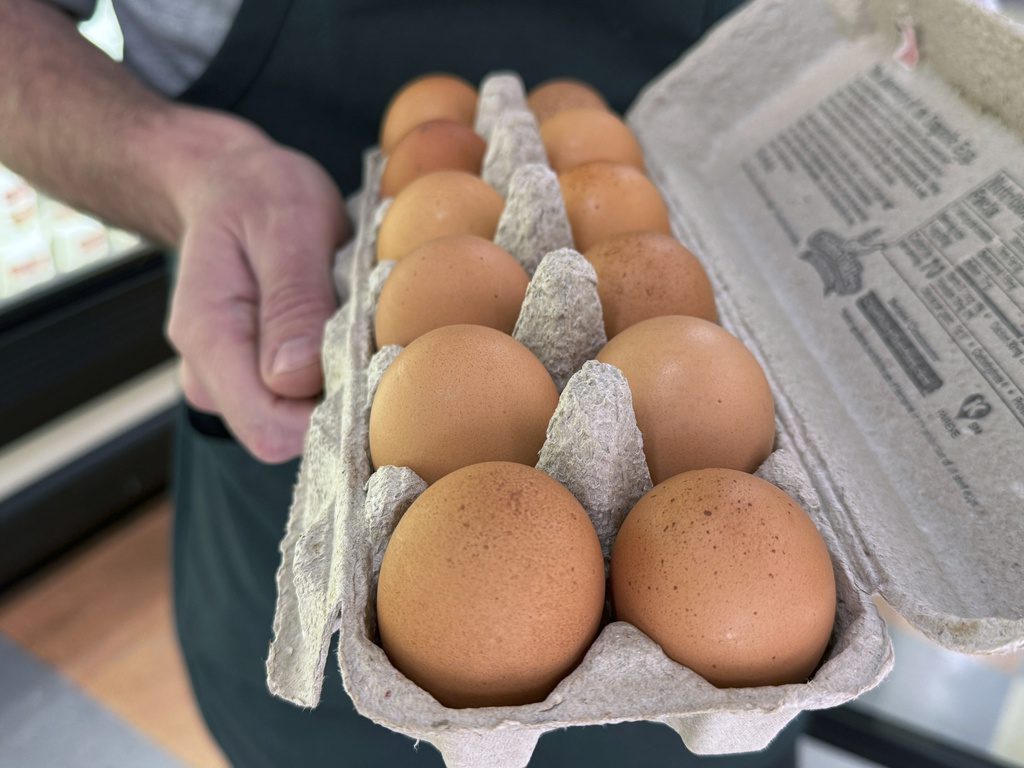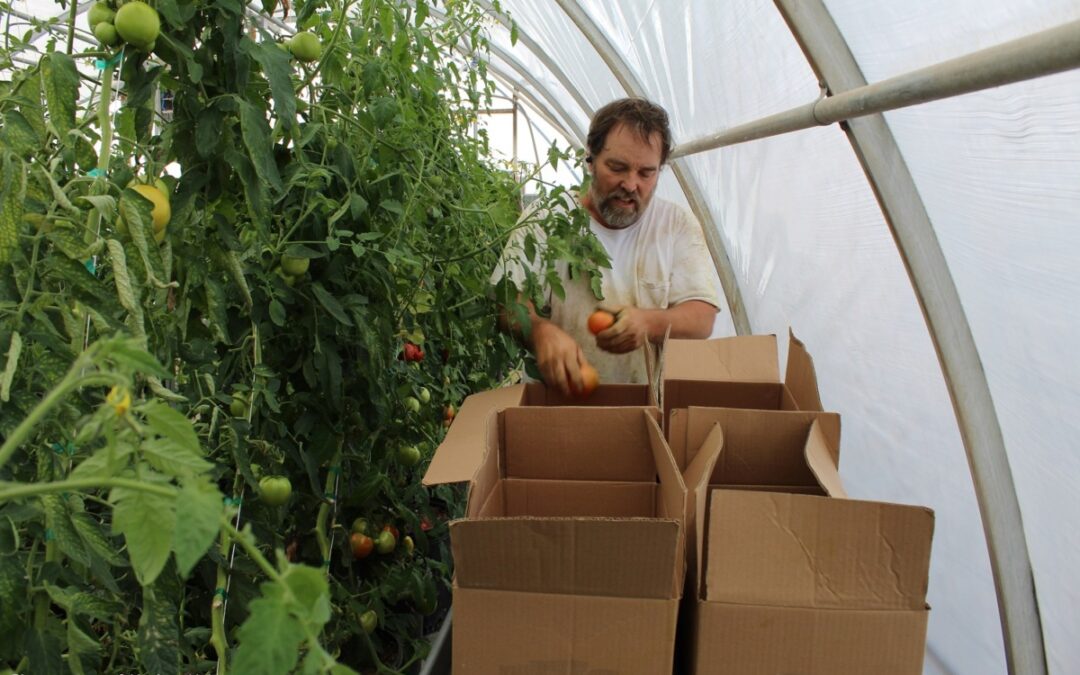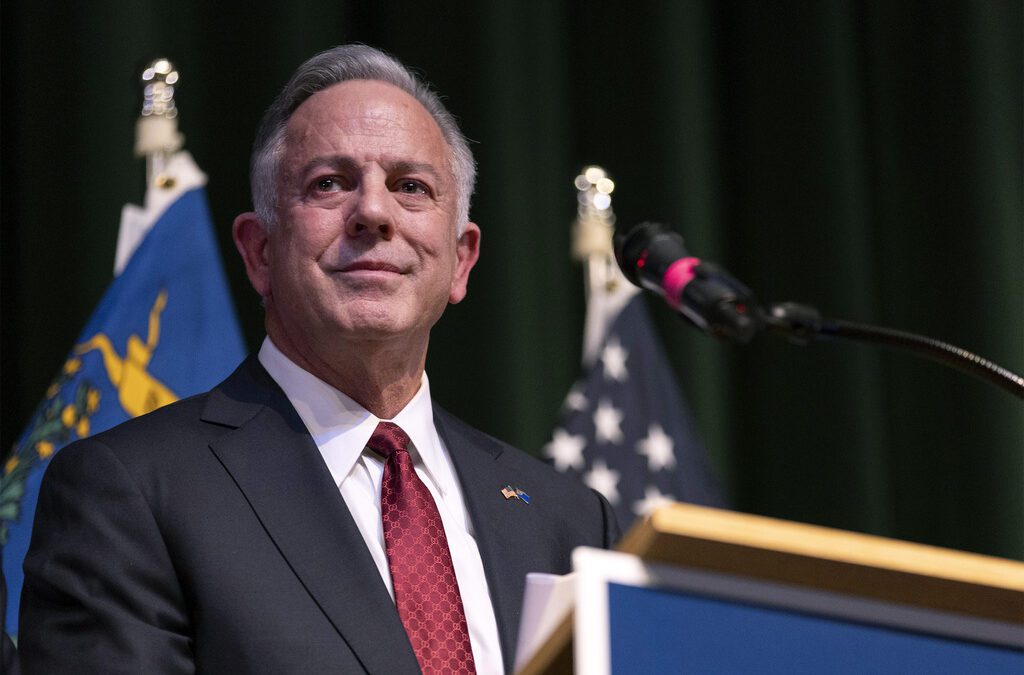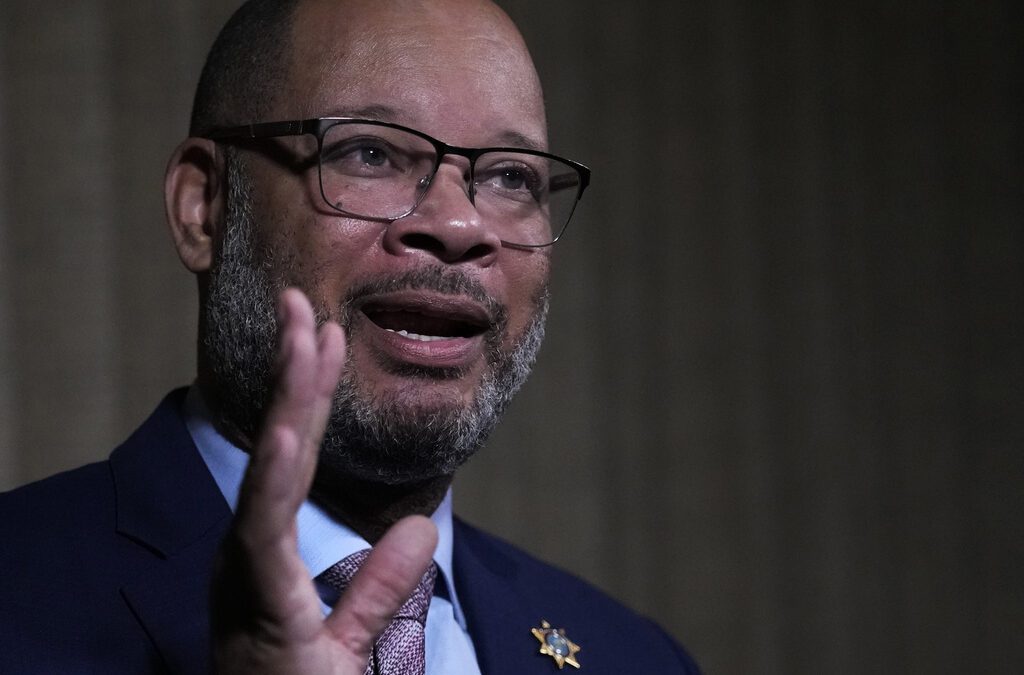
Joe Trimble, owner of Encinal Market, holds an open carton of eggs in Alameda, Calif., on Tuesday, Feb. 11, 2025. (AP Photo/Terry Chea)
While the bill seeks to allow officials to temporarily suspend the state’s prohibition on non-cage-free eggs, one expert told The Nevadan it may still be a while before we see a crack in egg prices.
State lawmakers are flocking around a new proposal they say will provide some relief to the price of chicken eggs, which have skyrocketed in recent months as a nationwide outbreak of the H5N1 avian flu has wreaked havoc on the supply of livestock.
The state Senate on Wednesday voted unanimously to send Assembly Bill 171 to Gov. Joe Lombardo’s desk to be signed into law, just one day after the measure was approved by Assemblymembers by a 41-0 margin. If enacted, the bill would authorize the State Quarantine Officer — a position within the Nevada Department of Agriculture — to temporarily suspend the state’s prohibition on non-cage-free eggs, as well as authorize the sale of “Grade B” eggs.
The bill would also make it easier for small business operators to bring their eggs to market. Though lawmakers noted Wednesday that it still may take time for egg prices to drop, it’s at least one way officials are trying to find a common ground around one of the most popular breakfast staples.
A spokesperson for Lombardo told The Nevadan the governor was reviewing the bill and gave no timetable for when it could be signed. But the swift passage through both chambers of the legislature signal it’s an issue that will likely be positively received by the governor.
MORE: Nevada legislators’ priorities taking shape during first week of session
“We would like to get [this bill] moving and cracking along, so that we can help to address what is an ongoing egg shortage here in Nevada,” said Senate Majority Leader Nicole Cannizzaro (D-Las Vegas).
News of the bill’s passage came the same day new federal data was released showing the average price for a dozen Grade A eggs spiked to its highest level on record, at $4.95 per dozen. The fast-moving measure appears to be a first-of-its-kind proposal, said David Ortega, a food economics and policy professor at Michigan State University, but may only have a nominal impact on the price of eggs.
“It likely wouldn’t really have that much of a sustained effect on egg prices in the long run because it doesn’t address the root cause of the increases we’re seeing in the sector, and that is the highly pathogenic avian influenza (HPAI),” Ortega said.
Over the last 30 days, more than 23 million birds have been affected by the most recent bird flu outbreak, according to the US Department of Agriculture. With millions of birds culled last year alone to mitigate the spread, the issue has become a matter of supply and demand, Ortega said, adding that egg prices will likely stay high until infections start to subside.
But combined with the introduction of Grade B eggs to supermarkets, prices might start to come down marginally. Ortega said Grade B eggs, like Grades A or AA, are safe to eat, but are largely used in commercial baking or liquid egg products because they contain cosmetic defects typically shunned by consumers in normal times.
“You could increase supply at the grocery store, but there might be a bit of an issue with consumer perception of these being lower-quality eggs, and that may limit demand,” Ortega said.
Current state law bars eggs from being sold if the hen laying them is confined in an enclosure not considered to be cage-free. That bill, AB399, was signed into law in 2021 after it had unanimous support from legislative Democrats and a small number of Senate Republicans.
Assemblymember Howard Watts (D-Las Vegas) told lawmakers while introducing the bill Monday that the new provisions would provide a legislative fix to AB399, which was meant to bolster living conditions for livestock, but did not account for supply chain snarls like those posed by the recent outbreak of H5N1.
“One thing we didn’t foresee was this massive bird flu pandemic and the impact it’s had on the supply chain,” said Watts, who also supported AB399.
The restriction on caged eggs, however, could only be lifted during a declared emergency, and only for up to 120 days at a time, as well as any other regulation relating to the sale of eggs. The State Quarantine Officer would only be permitted to suspend those regulations twice per calendar year, and they must notify the public when a temporary suspension will be issued.
At Monday’s hearing, Nevada Department of Agriculture Director JJ Goicochea told lawmakers during his testimony the bill would allow the state to procure eggs from a wider variety of sources, but it would in no way impact existing food safety or inspection standards.
“At no time can we — nor would we — import any product, whether it was a meat product, a live animal, or in this case, eggs, that was not expected and had not gone through that inspection process,” Goicochea said. “There is no way we’re going to do anything that would risk or jeopardize the health of Nevada citizens.”
Officials announced last month that HPAI had been detected in dairy cows in Churchill County, roughly a month after bird flu was found in Nye County. Dairy and meat products remain safe to eat, according to the CDC, noting the virus is unable to survive the milk pasteurization process.
CDC officials on Monday also confirmed a dairy farm worker in Churchill County was recently infected with a strain of bird flu, and has since recovered after dealing with mild symptoms and eye redness.
The individual did not require hospitalization.

USDA cancels funding for popular locally grown food programs in Nevada
By Jeniffer Solis - Nevada Current The U.S. Department of Agriculture has axed two programs that gave Nevada schools and food banks more than $6...

State bill would allow immigrant parents to designate legal guardians for kids if they’re deported
Assembly Bill 460 would create a legal process that authorizes a parent or guardian to pre-designate another person to act as a child’s primary...

Do you care about IVF access in Nevada? These senators have a plan to protect it.
A group of Nevada Democrats wants to protect in vitro fertilization (IVF) in the state—and they want to make it more accessible for people to get....

Nevada legislators’ priorities taking shape during first week of session
While Democrats and progressives plan to pursue bills to bolster tenants’ rights and universal school meals, Republicans are prioritizing expanding...

Four takeaways from Gov. Joe Lombardo’s State of the State address
In unveiling his $12.7 billion executive budget, Nevada’s Republican governor outlined the need for bipartisan solutions to bring down prices and...

Democratic Attorney General Aaron Ford to run for Nevada governor
The term-limited Ford cannot run again for Nevada Attorney General, but confirmed to The Nevadan he intends ‘to seek higher office,’ and is the...





